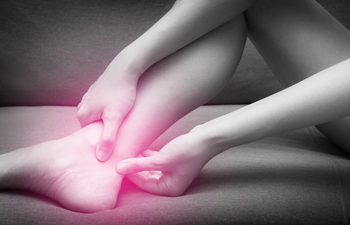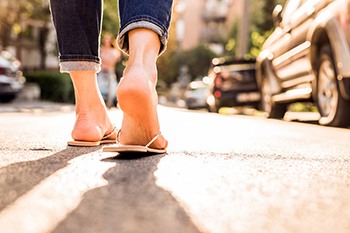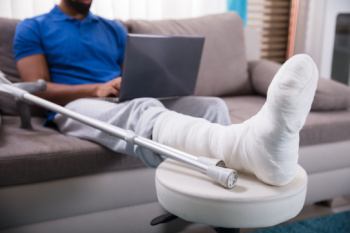Connect With Us
Blog

Achilles tendinopathy is a condition involving pain, stiffness, or swelling in the tendon that connects the calf muscles to the heel. Certain clinical factors may increase the chance of developing this issue. These include limited ankle flexibility, muscle weakness in the calf, or differences in leg length that affect movement. Individuals with a history of tendon injury, poor foot alignment, or tight lower leg muscles may also be at greater risk. Repetitive strain from sports, especially running or jumping, adds stress to the tendon, over time. In some cases, underlying conditions such as obesity or inflammatory diseases may contribute to the problem. Identifying and addressing these risks early can improve outcomes and help prevent chronic discomfort. If you are experiencing ongoing discomfort near your heel or lower leg, it is suggested that you speak with a podiatrist for a diagnosis and appropriate treatment.
Achilles tendon injuries need immediate attention to avoid future complications. If you have any concerns, contact one of our podiatrists of Crosstown Podiatry. Our doctors can provide the care you need to keep you pain-free and on your feet.
What Is the Achilles Tendon?
The Achilles tendon is a tendon that connects the lower leg muscles and calf to the heel of the foot. It is the strongest tendon in the human body and is essential for making movement possible. Because this tendon is such an integral part of the body, any injuries to it can create immense difficulties and should immediately be presented to a doctor.
What Are the Symptoms of an Achilles Tendon Injury?
There are various types of injuries that can affect the Achilles tendon. The two most common injuries are Achilles tendinitis and ruptures of the tendon.
Achilles Tendinitis Symptoms
- Inflammation
- Dull to severe pain
- Increased blood flow to the tendon
- Thickening of the tendon
Rupture Symptoms
- Extreme pain and swelling in the foot
- Total immobility
Treatment and Prevention
Achilles tendon injuries are diagnosed by a thorough physical evaluation, which can include an MRI. Treatment involves rest, physical therapy, and in some cases, surgery. However, various preventative measures can be taken to avoid these injuries, such as:
- Thorough stretching of the tendon before and after exercise
- Strengthening exercises like calf raises, squats, leg curls, leg extensions, leg raises, lunges, and leg presses
If you have any questions please feel free to contact our offices located in Wayne, Montclair, and Randolph, NJ . We offer the newest diagnostic tools and technology to treat your foot and ankle needs.

Flip flops may be a summer favorite, but they can negatively affect foot health. Most styles offer no arch support, cushioning, or heel stability. The lack of straps forces toes to grip the sandal with each step, leading to muscle fatigue and strain. Over time, this can contribute to plantar fasciitis, tendonitis or joint pain. Wearing flip flops for extended periods of time can also alter your gait and increase the risk of injury. A podiatrist can assess any pain caused by improper footwear and recommend supportive alternatives or custom orthotics. If you experience foot discomfort after wearing flip flops, it is suggested that you consult a podiatrist to protect your foot health and prevent long-term damage.
Flip-flops are not always the best choice of footwear. If you have any concerns about your feet or ankles, contact one of our podiatrists from Crosstown Podiatry. Our doctors will assist you with all of your foot and ankle needs.
Flip-Flops and Feet
When the weather starts warming up, people enjoy wearing flip-flops. Flip-flops are comfortable, stylish, and easy to slip on and off; they're perfect for any summer beach goer. However, these shoes can cause harm to the feet.
How Can Flip-Flops Affect Me Long-Term?
- Ankle problems
- Hip problems
- Lower back problems
- Pain in the balls of the feet
- Problems with foot arches
- Changes in the way you walk
Are There Injuries Associated with Flip-Flops?
Yes. Since flip-flops are relatively weak and do not provide the same amount of support as sneakers, people who wear flip-flops regularly are more susceptible to injuries. On top of that, the open nature of the shoe makes your feet more prone to other problems, such as cuts and even infections. Common injuries and ailments include:
- Sprained ankles
- Blisters
- Infections
- Cuts and Scrapes
I like Wearing Flip-Flops. Are There Safe Alternatives?
When buying flip-flops, try to find ones that have sturdy soles and that are made of high-quality materials that will support for your feet. These flip-flops will cost more but will also last longer as a result.
If you have any questions please feel free to contact our offices located in Wayne, Montclair, and Randolph, NJ . We offer the newest diagnostic and treatment technologies for all your foot and ankle needs.

A foot fracture can affect any of the 26 bones in the foot, including the toes, metatarsals, sesamoids near the big toe, and the rearfoot bones such as the navicular, talus, and heel bone. These foot fractures often result from twisting injuries, falls, or direct impact against a hard surface. Pain is usually immediate and worsens when placing weight on the foot. A podiatrist typically diagnoses a fracture using an X-ray to identify the location and type of break. In some cases, additional imaging may be required if the fracture is complex or not visible on standard X-rays. Treatment depends on which bone is fractured and the severity of the break. It often involves wearing a splint, cast, or a protective shoe or boot to stabilize the foot. Weight-bearing may be restricted for several weeks while the bone heals. If you have broken a bone in your foot, it is suggested that you make an immediate appointment with a podiatrist for an exam and appropriate treatment options.
A broken foot requires immediate medical attention and treatment. If you need your feet checked, contact one of our podiatrists from Crosstown Podiatry. Our doctors can provide the care you need to keep you pain-free and on your feet.
Broken Foot Causes, Symptoms, and Treatment
A broken foot is caused by one of the bones in the foot typically breaking when bended, crushed, or stretched beyond its natural capabilities. Usually the location of the fracture indicates how the break occurred, whether it was through an object, fall, or any other type of injury.
Common Symptoms of Broken Feet:
- Bruising
- Pain
- Redness
- Swelling
- Blue in color
- Numbness
- Cold
- Misshapen
- Cuts
- Deformities
Those that suspect they have a broken foot shoot seek urgent medical attention where a medical professional could diagnose the severity.
Treatment for broken bones varies depending on the cause, severity and location. Some will require the use of splints, casts or crutches while others could even involve surgery to repair the broken bones. Personal care includes the use of ice and keeping the foot stabilized and elevated.
If you have any questions please feel free to contact our offices located in Wayne, Montclair, and Randolph, NJ . We offer the newest diagnostic and treatment technologies for all your foot and ankle needs.

